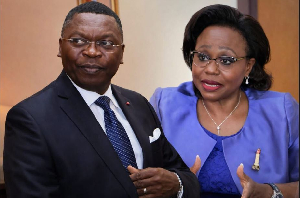Six months after the Cameroon striker died on the pitch, little in Algerian football has changed despite a promise that the truth will emerge.
Last August, Albert Ebossé Bodjongo, the Cameroonian striker at Algeria’s JS Kabylie club, was killed in the aftermath of an ugly defeat.
JS Kabylie conceded a goal in the final seconds of injury time against USM Alger, and projectiles rained onto both sets of players filing into Stade 1er Novembre’s tunnel.
According to some reports, a block of cement from a section of the stadium which was undergoing construction hit Ebossé in the head causing severe cranial trauma. He succumbed to his injuries a few minutes later, haemorrhaging to death.
But differing accounts on what happened that fateful evening have since emerged. The president of JS Kabylie, Mohand Hannachi, alleged that he died of a simple heart attack, while an autopsy conducted in Cameroon, at a military hospital, found that Ebossé was beaten to death.
Algeria’s Ministry of Justice opened an inquest on 19th December into his death, but the results of their investigation have not yet been published.
The Algerian Championnat was suspended for a number of weeks following Ebossé’s death.
The Confederation of African Football banned Kabylie from playing continental competitions for two years, while the Algerian Football Federation stipulated that they play the remainder of their matches behind closed doors. JS Kabylie also promised to pay the remainder of Ebossé’s contract to his family in Douala.
In Algeria, more extensive debates have raged about the role poor infrastructure plays in hooliganism. How was it that supporters gained access to a portion of the stadium still under construction?
Once there, they launched chunks of concrete onto the pitch. The Belgian coach Hugo Broos noted that only team medics were present to tend to those wounded and that other first aid personnel were unavailable. The lack of CCTV meant that it was impossible to identify and apprehend the culprits.
Advertisement A few weeks ago, JS Kabylie pleaded against Caf’s two-year ban in the Court of Arbitration of Sport. Cas found that the JS Kabylie delegates were not present during sentencing and Caf’s ruling was thus illegitimate. The continental sanctions were revoked, effective immediately.
Meanwhile, Hannachi embarked on a domestic crusade against the imposition of a huis-clos (playing matches behind closed doors), claiming Kabylie should be allowed to play in front of their supporters.
The Algerian Football Federation will make a decision on Hannachi’s appeal in March, but it granted JS Kabylie fans permission to attend the round of 16 of the Algerian Cup against CS Constantine last Friday. It was the first time the side played in front of their own fans since Ebossé’s death in August.
Though the lifting of the huis-clos was announced just a few days before the match, and it took place at a neutral ground, tickets sold out in hours.
To wholly comprehend the context of JS Kabylie’s stance, it is crucial to understand their ethos. JS Kabylie are not like any other club in Algeria.
The Kabylie is in the secluded highlands, home to Algeria’s indigenous Berber population. Kabyles are an offshoot demographic of the wider North African Berber population and they remain, arguably, the most marginalised minority in Algeria.
Political repression began in the 1970s when the then president Houari Boumediene began a system of Arabisation, placing an exclusive premium on the common language.
Boumediene meant to loosen the stranglehold the French language had on the young nation after 132 years of institutional colonisation. But in one fell swoop he oppressed the people of the Kabylie.
Several protests in favour of promoting Berber culture were brutally repressed. Kabyle was not recognised as a national language in Algeria until 2002.
Boumediene was present during the 1977 Algerian Cup final, which JS Kabylie won over NA Hussein-Dey. On the day inignandt supporters chanted, “Down with dictatorship”, “The Berber language will survive” and, most notoriously, “Pouvoir Assassin!” (Power Assassin).
An uncomfortable, stony-faced Boumediene could not react in the public eye, and ‘Pouvoir Assassin’ became a rallying cry in the Kabylie. When JS Kabylie kicked off their 1977/78 campaign, they did so under the name JE Tizi-Ouzou, Boumediene’s vengeful attempt at stripping the club of its ethnicity, and of its very essence.
The bad blood has persisted since then and JS Kabylie fans feel targeted in the same way many ethnocentric European clubs were under dictatorial regimes. General Franco and his repression of Catalan football is a salient parallel.
Before kick-off last Friday, JS Kabylie fans again sung, “Pouvoir Assassin!” along with other seditious chants, such as “As for Ebossé, the State killed him”. Neither JS Kabylie nor its supporters or the Algerian Football Federation have therefore assumed responsibility for Ebossé’s death.
The total absence of guilt means punitive measures have not been fully applied and the promise of wholesale changes to football’s infrastructure in Algeria have been set aside.
Last Friday’s round of 16 tie was contested at the Stade Omar Hamadi in Bologhine, Algiers. Body searches took place at each turnstile. Police asked spectators to open their mobile phones and take the batteries out, to check for explosives.
Water bottles, lighters, and any object that could be used as a missile were considered contraband, and were consequently confiscated. Short interrogations awaited supporters once they finally squeezed through the creaking mechanical gates.
It took 45 minutes of jostling to get through security. Tension mounted between the police officers manning barriers and impatient supporters, and a healthy number were clubbed by wooden batons.
When the match at last kicked off, JS Kabylie opened the scoring early, when the match finally kicked off, capitalising on a goalkeeping gaffe in the ninth minute. In the 70th minute, at the foot of the West Stand, JS Kabylie’s left-back Zinedine Mekkaoui was knocked over, but the linesman called the foul in favour of Hamza Boulemdais and CS Constantine.
A handful of furious JS Kabylie players accosted the linesman, who remained admirably unresponsive amidst a shower of spittle. A dozen makeshift manufactured missiles arced onto the pitch.
Immediately the JS Kabylie captain Ali Rial shot the supporters a stern look, and most sitting in the West Stand also turned to upbraid those launching projectiles.
JS Kabylie managed to hold on to their 1-0 lead. An roar drowned out the final whistle, and then reverberated the stadium’s skeletal foundations. JS Kabylie were in the quarter-finals of the Algerian Cup. Meanwhile, tucked away in a corner of the stadium, a life-sized poster of Ebossé undulated in the Mediterranean breeze.
The Cameroonian striker seemed another spectator, a reminder of what had gone before as his former teammates joined hands for celebratory whoops in front of each decrepit stand.
Last summer, Ebossé could have left JS Kabylie for European football. The Spanish second division side Ponferradina, for instance, announced that they had tabled an offer for him, but he was keen to continue his growth in Algeria.
“There was plenty of interest [from Europe],” he told the Algerian channel, DzairTV, “but I had a long discussion with president Hannachi, and I feel welcome at JS Kabylie. Tizi Ouzou is special. Here I feel as if I’m with my own family in Douala.”
Back in Douala, Ebossé’s mother recently stated that she felt abandoned by JS Kabylie as she has yet to receive her compensation. His father also claimed that not a single Algerian delegate was at his son’s burial.
Furthermore the Algerian justice system has failed the Ebossé family by seemingly shelving the inquest into the striker’s death. As for stadium infrastructure, it remains deplorable as ever. In shirking their responsibilities authorities have ensured Albert Ebossé died in vain.
Infos Sports of Friday, 27 February 2015
Source: theguardian.com













